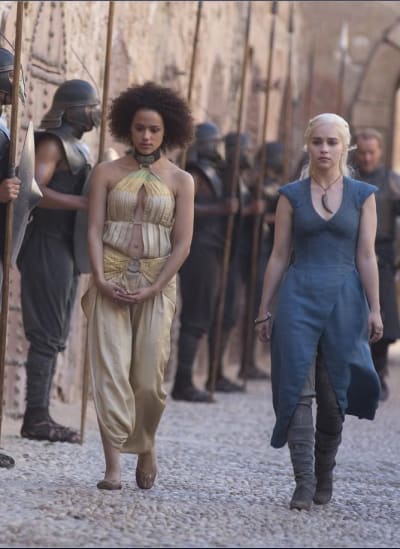I’d be lying if I said I wasn’t a Game of Thrones fan.
Full of drama, action, noteworthy betrayals, epic monologues, and its own language, Game of Thrones, adapted by HBO from the book series by George R.R. Martin, quickly stole the hearts of millions of people around the world.
In spite of a disappointing season finale episode, until recently, I would have argued that Game of Thrones was the best show of the last decade.
Then I found Watchmen.
For starters, the female characters in Watchmen were refreshing contrats to the “damsel in distress” or “sidekick” roles historically played by females on screen.
Both the show’s heroine and the show’s formidable villain Lady Trieu were strong female characters throughout the series.
While Game of Thrones had its share of strong female characters, most of them suffered confusing character shifts by the end of the series.
Assasin Arya Stark who has literally faced and conquered death ran for the hills when the castle starts to crumble.
Brienne of Tarth ditched her armor, lost her virginity, and ended up sobbing in a nightgown.
Cersei, the feared leader of King’s Landing, passively allowed a dragon to destroy her city without so much of a fight.
Most disturbingly, Daenerys, the beloved Mother of Dragons, completely lost her mind seemingly overnight and became a psychotic super villain.
In the end, Jon Snow, Tyrian Lannister, and Bran Stark were the true heroes of the series.
In addition to featuring strong women, Watchmen was packed with diverse, dynamic characters while Game of Thrones was more often than not overwhelmingly and inexplicably white.
From Harry Potter to Lord of The Rings, popular fantasy and sci-fi television shows and movies have historically lacked characters of color
Althouhgh the Marvel comics featured characters of different races, its first 17 movies featured white men.
Much of the conflict in Game of Thrones took place between the fair-skinned Lanisters and the very white Starks.
The only prominent black characters in Game Of Thrones were Missandei and Grey Worm — two ex-slaves who practically worshiped at the altar of their white savior Daenerys Targaryen.
While the showrunners of Game Thrones re-created a world full of dragons, White Walker zombies, and fire magic, a world teeming with diverse characters was apparently out of the question.
On the other hand, Watchmen’s thoughtful inclusion of non-white characters was an inspiring depiction of on-screen inclusion and diversity.
Half of the show’s principal characters were people of color, including the show’s incredibly talented leading lady Regina King.
Black actresses seldom have the opportunity to play leading roles in action-packed fantasy and sci-fi dramas.
As a black woman, it was incredibly empowering and at times emotionally moving to watch another black woman play the role of a heroine on screen
Not only was the Watchmen cast more representative of an increasingly diverse America, but several of the episodes were also co-written by black writers.
In addition to a featuring a diverse cast, Watchmen tackled important, timely issues like race, privilege, and social justice, and wrestled with the complexities of morality.
Loosely based on the 1987 Watchmen comic books, the series focused on events surrounding the 1921 race massacre in Tulsa, Oklahoma.
The factual and historical references in the show provided a solid foundation for impactful storytelling.
The Watchmen showrunners successfully found a way to inspire reflective contemplation without strangling the story with a political agenda or compromising the entertainment value of the show.
Unlike Watchmen, Game of Thrones failed to comment on any real pressing social issues.
While the ongoing action and shock factor kept audiences actively engaged, Game of Thrones did not cause viewers to ask any deep life questions or contemplate any pressing social issues.
Instead, Game of Thrones served more as a white-washed escape from the everyday problems in America.
Even the show’s attempted political and power-related themes were drowned out in a sea of extravaganza and spectacle.
Every now and then, it can be nice to escape the pressing realities of the real world.
However, stories that can both entertain and challenge audiences to examine their ideas and beliefs are not only advantageous but necessary, for human evolution.
From the Bible to Greek Mythology, stories inform us about the world around us and shape how we relate to one another.
Watchmen has the ability to inspire greater compassion and understanding of people for years to come, while shows like Game of Thrones will likely only be remembered purely for their entertainment value.
In all fairness, with eight full seasons under its belt, Game of Thrones has a much more extensive content library to critique than Watchmen.
For the most part, Game of Thrones managed to maintain it’s momentum for all eight seasons with unparalleled ratings for its final seasons.

By choosing to remain politically neutral and refraining from commenting on anything too bold or controversial, Game of Thrones was able to capture a broad array of loyal fanatics.
It’s entirely possible that if Watchmen were to continue, the magic that so eloquently weaved together the fabric of the first season might fade.
Nonetheless, in just one season, Watchmen set a new, more inclusive standard for all sci-fi and fantasy programming.
I hope other programs continue to follow in Watchmen’s footsteps by telling stories that force us all to think more critically about ourselves and the world we live in.
With the bar set incredibly high for 2020, I’m excited to see what the next decade has in store!
Kiara Imani is a staff writer for TV Fanatic. Follow her on Twitter.




















![[Book Review] The Blade Itself (The First Law Trilogy) by Joe Abercrombie](https://bendthekneegot.com/wp-content/uploads/2018/01/1516047103_maxresdefault-218x150.jpg)



























